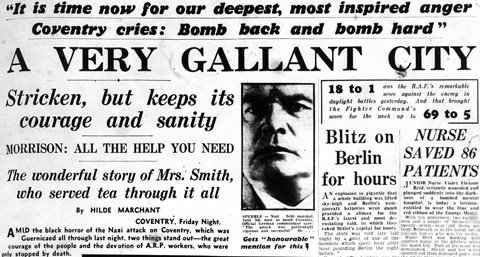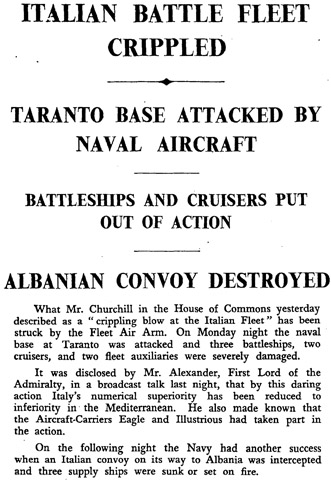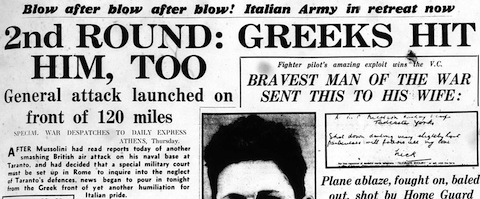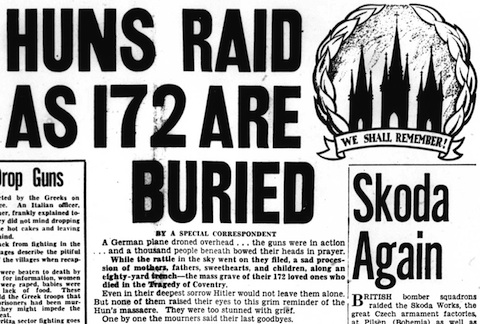
News of Coventry’s tragedy — Hilde Marchant, writing on the front page of the Daily Express, above, says the city was ‘Guernicaed’ all Thursday night — has reached the morning press (though it was announced by the government yesterday and would have been reported on the BBC and in the evening papers). Initial reports are that casualties amount to about a thousand people, killed or wounded. It is clearly a great shock to the nation: the Manchester Guardian‘s London correspondent says that the news ‘has hit Londoners, I believe, harder than any of the attacks on themselves’ (6). It’s the first time an urban centre outside the capital has been blitzed in this way. Those who have already experienced London’s intense bombardment can imagine how much harder to cope it would have been for the much smaller city of Coventry. For the rest of us, Marchant gives a sense of the devastation:
The shopping centre of Coventry is one choking mass of ruins, fire, and people who, by some miracle, have emerged alive.
They walk through this skeleton of the city centre with faces stained black, breathing the smoke of their homes, trying to find their families and friends, not sure of the way through their own streets.
The front page features a photograph of the suddenly ruined Coventry Cathedral.

‘Coventry Cathedral, in the centre of the city, is just a shell, ruined, not by time, but by one night’s savage, vicious bombing…’
Coventry is known as the City of the Three Spires. The Cathedral of St. Michael possessing one of them, was a fine building in the Perpendicular style, dating from 1373-94.
While all of this might sound like the death of Coventry, Marchant asked the major, J. A. Moseley, ‘if there was to be a general evacuation of the city’:
OF COURSE NOT. WE STAY.
She uses words like ‘disaster’ and ‘devastation’ but stresses that while survivors were ‘shaken and shocked’ they were ‘by no means panicked’ (6):
The wardens said they had no hysterics in the night, no terror, no stampede. People had wept — I saw there were many with red eyes — but they had a courage that kept them sane in the midst of this insanity.
The Daily Mirror‘s (unnamed) ‘special correspondent’ does not contradict this, but lays more emphasis on the voluntary, spontaneous exodus from Coventry, of people afraid that the bombers would return the night after the raid (1):
Pathetic streams of refugees, men, women and children were trekking to the safety of the countryside when darkness fell last night.
Every road out of the city, which had had a bomb rained on it at the rate of one a minute, was filled with the same tragic procession.
I find it interesting that the subeditor has followed this with the subheading ‘Thousands Stay’. But while this is technically accurate …
All day long this had gone on. By nightfall there will still thousands of people who had stayed behind
… it’s actually a little misleading:
to the last minute in the hope of salving more of their treasured belongings.
So according the Mirror‘s correspondent, these thousands weren’t staying in Coventry to face the Germans again, they were only staying until the last possible moment, and by implication then leaving to escape the chance of being bombed again.
Like the Express, the Mirror features Coventry prominently on its front (and back) pages, though it gives its biggest headline to a speech by Oliver Lyttelton, President of the Board of Trade, announcing new rationing measures (spun positively as ‘EVERYONE TO FIGHT HITLER’, 1). The Times and the Manchester Guardian are more reticent, the former leading with ‘BATTLE ALONG ALBANIAN FRONT’ (4), the latter with ‘HEAVY RAID ON BERLIN’. The Guardian does also feature a firsthand account from ‘A citizen of Coventry’ (9):
“But the attack was as persistent as it was ruthless,” he said. “At times it seemed that there must be a hundred enemy ‘planes overhead. Bombs were constantly whistling down and exploding, not on military objectives but without discrimination on the business centre of the town, on the suburbs, and on industrial buildings.
What is the meaning of Coventry? Again, the Guardian and The Times seem reluctant to give it much prominence on their editorial pages: it’s the third leading article in the latter and the second in the former. The Guardian downplays the damage: ‘it would take many more such nights to cripple it as a centre of war production or to drive its population to despair’ (6). The Times puts its emphases on the need to make sure that the people of Coventry are promptly looked after, the need for Coventry to make sure its production of war materiel is not interrupted, and the need for the Air Ministry to ‘intensify its efforts to make greater the price paid by such night raiders’ (5). The Express expands on this last point (after a ritual declaration that Coventry ‘MUST be avenged’, 4):
In the meantime we want less talk about the so-called slackening of the blitz when the Germans don’t get through for one reason or another, and more action to beat the night bomber.
It doesn’t offer a solution, but would rely upon British brains (‘We are far cleverer than they’, the Germans) to find one:
Pool the ideas and experiences; co-ordinate; investigate; devise. How urgent it is to get busier, busier, BUSIER, in finding the solution.
Ultimately this will be done (‘The airplane is at best a clumsy and vulnerable weapon’). ‘But the clock ticks on’.
![]() This work is licensed under a Creative Commons Attribution-NonCommercial-NoDerivatives 4.0 International License.
Permissions beyond the scope of this license may be available at http://airminded.org/copyright/.
This work is licensed under a Creative Commons Attribution-NonCommercial-NoDerivatives 4.0 International License.
Permissions beyond the scope of this license may be available at http://airminded.org/copyright/.






So I’m digging around in my notes for one reason or another, and I come across the Alvis insurance claims for the Coventry attack. (From David Thomas, War, Industry, and Society: the Midlands, 1939–1945 [Routledge, 1989]): Buildings, £195,800; Plant and machinery, 62,500; Furniture, fixtures and fittings, 23,000; Loose tools, 20,000; Jigs, patterns, and drawings, 11,700. Interestingly, and contra the USSBS, it is the loss in machine tools that was felt most keenly…..
Leading to dreadful anticipation of tomorrow, when the bombers hit Birmingham.
Linguistically interesting that Coventry, which caused the term ‘Coventrate’ (as per your other post above) received the term’Guernicaed’ at the time, carrying that term forward. As we now know both were only of temporary use, the more general – and inaccurate – ‘Blitz’ standing in down to today, with a side order perhaps of ‘Nuked’, due in just under five years.
Of course the effect on the people was a lot more than ‘linguistically interesting’ – the danger of studying history can be accidental callousness. I don’t know about anyone else, but the post blog brings an immediacy of the time to life for me, greater than hindsight’s history or a straight account of the events.
Because we know, it’s hard to remember that they didn’t know what tomorrow held.
JDK:
I can’t quantify it, but from this sample of newspapers I’m tempted to say that ‘blitz’ was used more often to describe the bombing of German cities rather than the bombing of British ones (there’s a good example in the Express headline seen above). Which is interesting for both the evolution of the word and for the implication that the RAF’s ‘blitz’ was carried out in the same way as the Luftwaffe’s.
Pingback: Airminded · Sunday, 17 November 1940
I was thinking of the retrospective use of Blitz when talking about bombing, rather than the (relatively contemporary) wartime use (and relating that to the swift disappearance of the C and G words) – but that’s an interesting point as well.
Pingback: Airminded · Tuesday, 19 November 1940
Pingback: Airminded · Thursday, 21 November 1940
Pingback: Airminded · Thursday, 30 April 1942